Top Rankings
Deaf/Blind School District ranks among the top 20% of public school district in Florida for:
Category
Attribute
Graduation Rate
Highest graduation rate (Top 20%)
Diversity
Most diverse schools (Top 1%)
Student Attention
Lowest student:teacher ratio (Top 1%)
For the 2025 school year, there are 2 public high schools serving 279 students in Deaf/Blind School District. This district's average high testing ranking is 1/10, which is in the bottom 50% of public high schools in Florida.
Public High Schools in Deaf/Blind School District have an average math proficiency score of 20% (versus the Florida public high school average of 42%), and reading proficiency score of 27% (versus the 51% statewide average).
Public High School in Deaf/Blind School District have a Graduation Rate of 83%, which is less than the Florida average of 87%.
The school with highest graduation rate is Deaf High School (Fsdb), with 80-89% graduation rate. Read more about public school graduation rate statistics in Florida or national school graduation rate statistics.
Minority enrollment is 55% of the student body (majority Hispanic), which is less than the Florida public high school average of 65% (majority Hispanic).
Overview
This School District
This State (FL)
# Schools
5 Schools
1,351 Schools
# Students
510 Students
1,018,327 Students
# Teachers
84 Teachers
47,312 Teachers
Student : Teacher Ratio
6:1
6:1
District Rank
Deaf/Blind School District, which is ranked within the bottom 50% of all 73 school districts in Florida (based off of combined math and reading proficiency testing data) for the 2021-2022 school year.
The school district's graduation rate of 90-94% has increased from 40-49% over five school years.
Overall District Rank
#73 out of 73 school districts
(Bottom 50%)
(Bottom 50%)
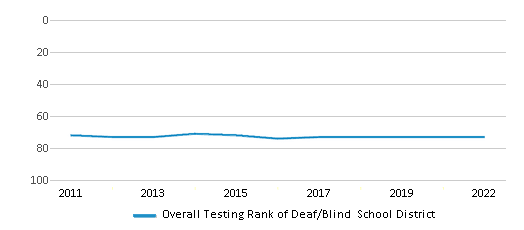
Math Test Scores (% Proficient)
19%
52%
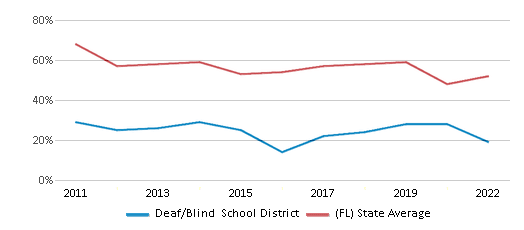
Reading/Language Arts Test Scores (% Proficient)
19%
52%
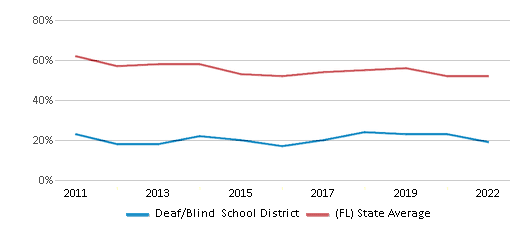
Science Test Scores (% Proficient)
30-34%
52%
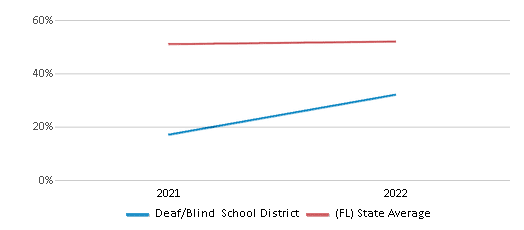
Graduation Rate
90-94%
87%
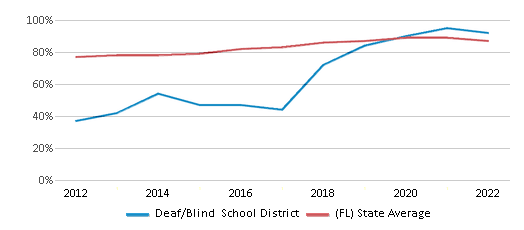
Students by Ethnicity:
Diversity Score
0.69
0.70
# American Indian Students
n/a
2,850 Students
% American Indian Students
n/a
n/a
# Asian Students
27 Students
29,850 Students
% Asian Students
5%
3%
# Hispanic Students
134 Students
371,091 Students
% Hispanic Students
26%
37%
# Black Students
87 Students
215,821 Students
% Black Students
17%
21%
# White Students
238 Students
358,997 Students
% White Students
47%
35%
# Hawaiian Students
1 Student
1,845 Students
% Hawaiian Students
n/a
n/a
# Two or more races Students
23 Students
37,873 Students
% of Two or more races Students
5%
4%
Students by Grade:
# Students in PK Grade:
20
2,742
# Students in K Grade:
13
6,456
# Students in 1st Grade:
13
6,640
# Students in 2nd Grade:
12
6,803
# Students in 3rd Grade:
22
7,448
# Students in 4th Grade:
24
7,271
# Students in 5th Grade:
20
6,880
# Students in 6th Grade:
29
19,490
# Students in 7th Grade:
38
24,772
# Students in 8th Grade:
40
26,189
# Students in 9th Grade:
70
233,011
# Students in 10th Grade:
59
236,046
# Students in 11th Grade:
54
221,011
# Students in 12th Grade:
96
213,568
# Ungraded Students:
-
-
Best Deaf/Blind School District Public High Schools (2025)
School
(Math and Reading Proficiency)
(Math and Reading Proficiency)
Location
Grades
Students
Rank: #11.
Blind High School (Fsdb)
Special Education School
(Math: 20-29% | Reading: 40-49%)
Rank:
Rank:
3/
Bottom 50%10
207 San Marco Ave
Saint Augustine, FL 32084
(904) 827-2700
Saint Augustine, FL 32084
(904) 827-2700
Grades: 9-12
| 108 students
Rank: #22.
Deaf High School (Fsdb)
Special Education School
(Math: 15-19% | Reading: ≤10%)
Rank:
Rank:
1/
Bottom 50%10
207 San Marco Ave
Saint Augustine, FL 32084
(904) 827-2500
Saint Augustine, FL 32084
(904) 827-2500
Grades: 9-12
| 171 students
Recent Articles

What Is A Charter School?
Explore the world of charter schools in this comprehensive guide. Learn about their history, how they operate, and the pros and cons of this educational innovation. Discover key facts about charter schools, including admission policies, demographics, and funding, as well as what to look for when considering a charter school for your child.

10 Reasons Why High School Sports Benefit Students
Discover the 10 compelling reasons why high school sports are beneficial for students. This comprehensive article explores how athletics enhance academic performance, foster personal growth, and develop crucial life skills. From improved fitness and time management to leadership development and community representation, learn why participating in high school sports can be a game-changer for students' overall success and well-being.

February 05, 2025
Understanding the U.S. Department of Education: Structure, Impact, and EvolutionWe explore how the Department of Education shapes American education, from its cabinet-level leadership to its impact on millions of students, written for general audiences seeking clarity on this vital institution.





